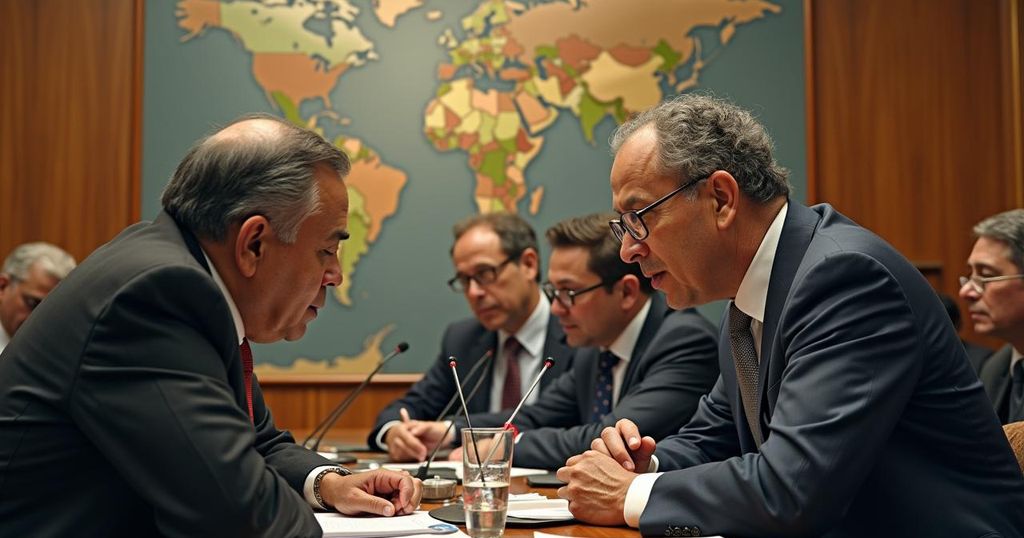Bolivia has joined South Africa in a genocide case against Israel at the International Court of Justice amid the ongoing conflict in Gaza. Bolivia accused Israel of genocidal acts following the escalation of violence, which has resulted in 42,000 Palestinian deaths since October 2023. A total of 14 nations have expressed interest in intervening in the case, highlighting global concerns regarding Israel’s military actions and rights violations in the Palestinian territories.
In a significant legal move, Bolivia has allied with South Africa to join a genocide case against Israel at the International Court of Justice (ICJ) amid the ongoing conflict in Gaza. This decision follows closely after the anniversary of the Hamas attack and Israel’s actions in Gaza. On October 9, 2023, Bolivia lodged an appeal at the ICJ, accusing Israel of committing “genocidal acts” in Gaza, aligning its claims with those of South Africa, which has accused Israel of violating the 1948 Genocide Convention. Bolivia’s commitment to speaking against these alleged atrocities is reflected in its formal declaration that it seeks to “condemn the crime of genocide”. This assertion emphasizes Bolivia’s moral responsibility in denouncing such actions. Concurrently, Bolivia severed its diplomatic connections with Israel in November 2022 due to the ongoing military actions affecting the Palestinian population. Despite the situation, 14 nations, including Colombia, Turkey, and Mexico, have supported or initiated interventions against Israel at the ICJ, citing various breaches of humanitarian principles and genocide allegations. These other nations have collectively accused Israel of severe violations during its military operations, which have reportedly resulted in extensive civilian casualties. The alarming toll, approaching 42,000 Palestinians since the conflict escalated on October 7, 2023, raises significant humanitarian concerns, particularly with the resurgence of tensions extending into Lebanon against Hezbollah forces. Various countries have formally expressed their intentions to participate in the case against Israel, emphasizing a broader international call for accountability. South Africa had originally filed the case against Israel on December 29, 2023, alleging that the country engaged in genocidal practices during its military actions and restricted humanitarian aid. At the ICJ hearings, Israel defended its actions as self-defense but was urged to mitigate harm to civilians, a plea that has reportedly gone unheeded as the violence continues. As the situation develops, the implications of Bolivia’s involvement and the collective stance taken by these nations may lead to significant international discourse surrounding accountability and humanitarian rights.
The context of this case is deeply entrenched in the ongoing Israeli-Palestinian conflict, particularly focusing on Israel’s military actions in Gaza. The situation has escalated dramatically, with significant loss of life and humanitarian challenges faced by the Palestinian population. Bolivia’s involvement reflects a larger trend among several nations who are raising concerns over Israel’s military tactics and accusations of genocide. The historical backdrop includes the 1948 Genocide Convention, which establishes the obligation for signatory states to prevent and punish acts of genocide, thus giving legal ground to these allegations. The global community’s response to the conflict, especially as tensions rise with other regional actors like Iran and Hezbollah, further complicates the situation.
In conclusion, Bolivia’s partnership with South Africa to pursue a genocide case against Israel at the ICJ signifies a growing international coalition that is demanding accountability and adherence to humanitarian laws amidst a backdrop of extensive civilian casualties in the ongoing conflict. The involvement of multiple nations echoes a broader recognition of the need for intervention in this crisis, as the ICJ hears claims of alleged genocidal actions. The international legal and diplomatic ramifications of this case could potentially shape future discussions on human rights and state accountability in armed conflicts.
Original Source: www.outlookindia.com







